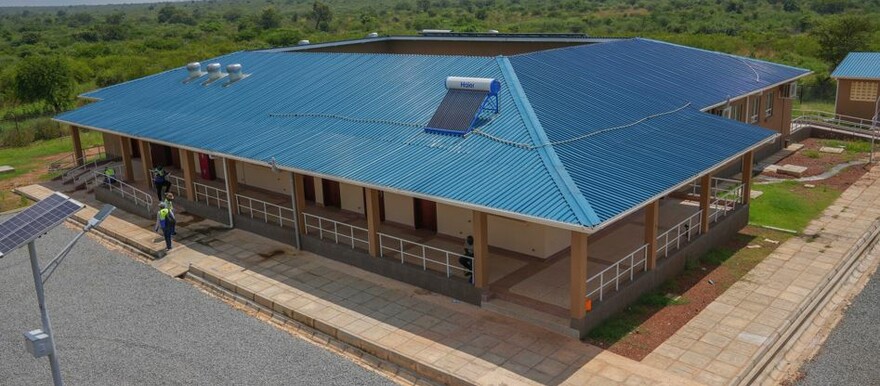Newly constructed health facilities in Nimule and Wounthou, together with a mobile laboratory and different equipment, were on Thursday handed over to the South Sudan Ministry of Health, as part of the European Union-funded EU-IGAD COVID-19 Response project supporting countries in the IGAD region to strengthen their healthcare system.
These facilities will improve healthcare for the communities in the bordering area between South Sudan, Sudan, and Uganda, a statement said.
“The Isolation/Quarantine and Screening Facility in Nimule, for which the EU earmarked some 715,000 Euros, has multiple rooms for medical personnel, examination and treatment of patients, and accompanying services in the total size of around 700 square meters. In addition to serving as a health center for the South Sudan – Uganda border, it will also provide medical care to the people from the border area of Nimule and Magwi County in South Sudan, Adjumani and Elegu in Uganda,” the statement read. “Wounthou Screening and Quarantine Facility for taking care of patients before referral, which construction the EU funded with 1,150,000 Euros, has ten rooms with beds within the quarantine building. It is also composed of a screening area and different auxiliary buildings. It will serve the population from the border areas between Sudan and South Sudan.”
The health facilities in Nimule, Wounthou, and nearby Renk Hospital are provided with furniture and medical equipment valued at 232,300 Euros. The health facilities were designed and constructed within the EU-IGAD COVID-19 Response Project centrally managed by UNOPS Project Management Unit (PMU) Djibouti and coordinated by IGAD, while the construction was led by UNOPS Uganda in close coordination with the PMU. This activity was part of the project’s objective to strengthen the healthcare systems in the IGAD region and mitigate the health and socio-economic impact of COVID-19 as part of the European Union’s continued support.
The Project also donated a mobile laboratory worth 167,000 Euros to be used in cross-border and remote areas, but it will also serve South Sudan according to the need.
“This will help health workers to reach out to the patients’ sites. Beneficiaries of the lab are people in cross-border areas, truck drivers in main truck stop/parking areas, people crossing the border in case of mass population movement or displacement e.g., refugees and host communities, internally displaced persons (IDPs), and returnees,” it added. “Medical testing in this laboratory will be related to the epidemic and pandemic diseases, but it can also be equipped to diagnose prevalent diseases in the target area. The lab will be used to collect specimens from suspected cases at the cross-border areas and for sample transportation to the nearest lab to be tested.”
Previously under this EU-funded project, three ambulance vehicles, one mobile laboratory, 817,185 PPEs (personal protective equipment), 25,056 COVID-19 test kits, and two PCR machines were delivered to South Sudan to support the country in tackling the COVID-19 pandemic. This was part of the project’s effort to improve the health response and support cross-border communities and vulnerable populations during the pandemic.
Funded by the European Union, the €60 million EU-IGAD COVID-19 Response project is managed by UNOPS PMU in Djibouti, coordinated by IGAD, and implemented by International Organization for Migration (IOM), TradeMark East Africa (TMEA) and the United Nations Children’s Fund (UNICEF) and United Nation Office for Project Services (UNOPS) to provide a cohesive and coordinated COVID-19 response across the IGAD region in Djibouti, Ethiopia, Kenya, Somalia, South Sudan, Sudan and Uganda and to strengthen the health care systems.
The project focused on critical cross-border areas in the region and aims to enhance IGAD’s coordination capacity, increase access to health and water, sanitation, and hygiene (WASH) services, combat gender-based violence, improve community engagement, ensure borders are safe for trade, and promote digital health solutions. The German government co-funded the digital health solutions component and independently managed and implemented by GIZ.



